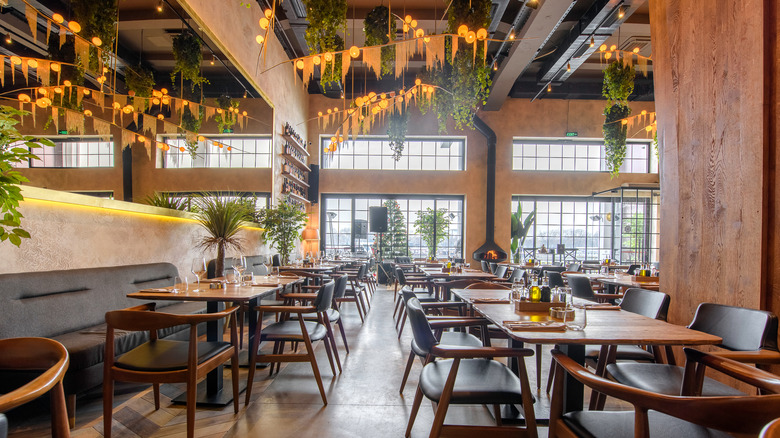New Survey Reveals Why People Are Cutting Back On Dining Out
Life is getting very expensive. If your weekly grocery bill has reached such dizzying heights that it makes you feel faint and the price of fuel has forced you to take up walking, you are not alone. The cost of living is going up, way up, and people are struggling. In fact, Trading Economics reports that the national inflation rate hit 8.5% in March while food prices climbed to 8.8% — the highest that either figure had been since 1981. These skyrocketing inflation rates are making huge dents in wallets and bank accounts everywhere. To make matters worse, a LendingClub survey suggests that a whopping 64% of Americans are now living paycheck to paycheck (per CNBC). Some families can barely afford the basics.
As Americans tighten their belts, they have to determine what is a "need" versus a "want." Some things are a necessity. People have got to eat, heat or cool their homes, have clothes on their backs, and get to and from work. With these "must-haves" swallowing up a sizable chunk of people's incomes, they have to sacrifice the items that are on their "want" list. According to a recent survey, Americans have resoundingly pinpointed one way that they can save money. And their response may surprise you.
Cash-strapped Americans are increasingly eating at home
A survey conducted by First Insight reveals that the way 42% of people will reduce their expenses is by cutting back on restaurant visits. The second-place response — reducing entertainment costs — was noticeably lower, sitting at just 33% (per Food Business News). While both of these items are mere "wants," this is bad news for the already struggling restaurant industry. AP News reports that wholesale food prices rose 9.7% over the course of 2021, according to the Labor Department, marking the highest rise recorded over the course of the year. Securities analyst Alexander Lin told CBS News that rising labor costs also contribute to the price of food. These costs get passed on to the customer. And these customers are increasingly unable to absorb these rises.
Furthermore, the pandemic has made indelible changes to the lifestyles of many. The CEO of First Insight, Greg Petro, explains, "With pandemic restaurant closures followed by limited re-openings because of the Great Resignation, dining out has become much less of a habit for many consumers today." It is far easier to "sacrifice" something that is no longer part of one's daily existence than it is to cut back on things that we have come to rely on like Netflix or Wi-Fi. And for many, restaurant visits are but a distant memory and a luxury they can no longer afford.

